Over 13,000 Call To Free Iranian Teachers
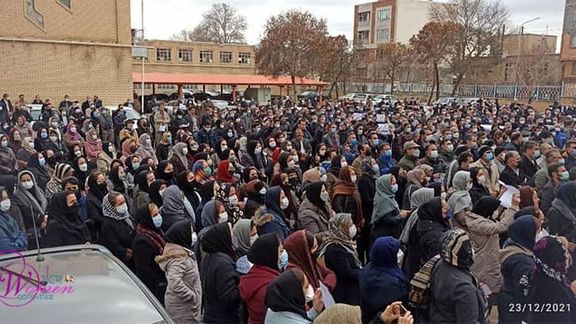
Over 13,000 working and retired Iranian teachers have signed a petition to put pressure on the regime to release imprisoned colleagues.

Over 13,000 working and retired Iranian teachers have signed a petition to put pressure on the regime to release imprisoned colleagues.
The group of teachers launched a campaign on Friday to collect 100,000 signatures calling for the release of detained educators and an end to their harassment.
Esmail Abdi, a teachers’ union leader who has been in prison since 2015 backed the initiative by sending a message from jail. He said that the extent of repression against teachers has expanded in recent years.
Teachers' Unions of Tehran, Markazi, North Khorasan, Kordestan, and Eslamshahr have also supported the campaign.
In a statement they said the Islamic Republic's security and judicial institutions have issued long-term prison sentences for protesting teachers in various provinces, while hundreds of others have been dismissed or forced into early retirement.
Last week, 1,200 teachers sent a letter to the heads of the three branches of government asking them to release detained union activists and end harassment by security forces, claiming the Judiciary continues to fabricate legal cases against union members. However, the president and the head of the judiciary refused to accept the letter.
Teachers maintain that they have pursued their demands through peaceful and legal means for two decades, but the Islamic Republic has always dealt with them through force and intimidation.
Teachers have been demanding higher wages and pensions for years, one of the lowest paid government employees. In the 2010s, government appointed officials embezzled hundreds of millions of dollars from their pension fund, without any serious consequences.
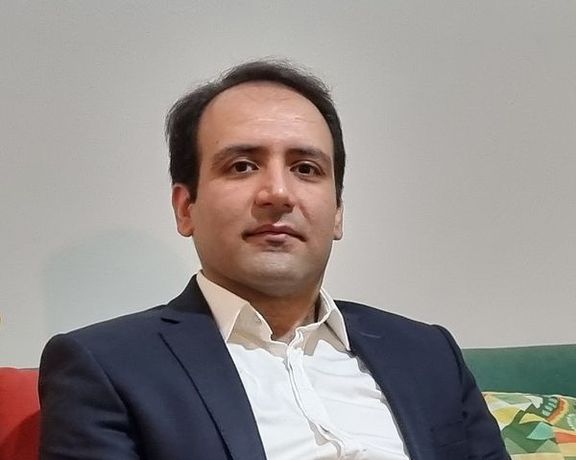
Iranian activist Majid Tavakoli has been sentenced to six years in prison on charges of threatening state security.
Tavakoli is a student leader, human rights activist, and political prisoner and was arrested at least three times by the Iranian Ministry of Intelligence during the student protests over the disputed Presidential Election of 2009.
Charges include espionage and creating propaganda against the state.
In response to allegations that he cross-dressed as a disguise to avoid arrest, a campaign protesting his imprisonment featured men posting photos of themselves wearing hijab.
He was arrested again during the Iranian protests following the death of Mahsa Amini in September.
Tavakoli announced the news if his sentence on Twitter and said in addition to his prison sentence he has received a two year ban on online activities, a two year ban from staying in Tehran, and a two year travel ban.
“This verdict is issued only because of my writings in the last few years. Due to my insistence on independent activity, there is no evidence of such activities or connection with the hostile government,” read his tweet.
It is all too common for activists to be falsely accused of such charges of espionage and colluding with foreign groups, for which the regime justifies they pay a heavy price in its brutal jails.
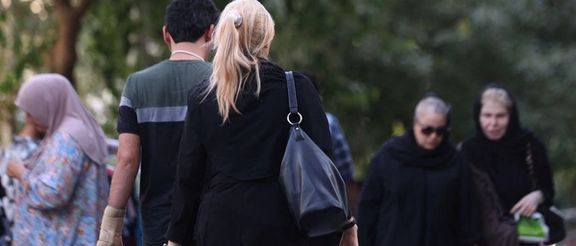
Rights activists and lawyers fear the presence of standby judges in morality police vans that made a reappearance in the streets of Tehran Sunday.
Speaking to Dideban-e Iran news website Monday, lawyer and women’s rights activist Shima Ghoosheh said the new move smacks of wartime measures.
“We can’t send a judge to make a ruling there and then and carry out the law. This is in opposition with all of the principles of human rights, rights of defendants, due process and logical principles that any rational person abides by,” she said.
“I’m not sure if they even have as many judges as they have patrol vans, or if they can hold field courts inside these vans. We don’t even have something as a field court [in Iranian laws],” she said.
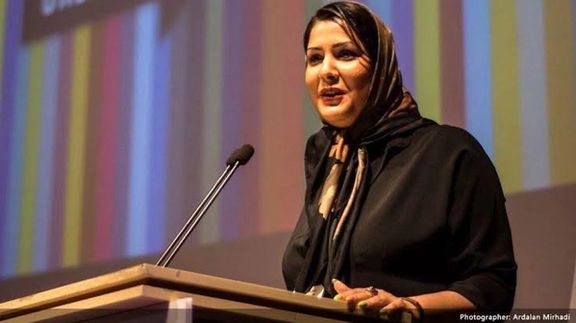
The Revolutionary Guards (IRGC) linked Tasnim news agency reported the news of the standby judges, in place to decide whether women who have refused to abide by the compulsory hijab rules on the streets should be detained or could be released with only a verbal warning.
Iran's hijab police street patrols have again appeared in the streets of Tehran and some other larger cities after months of laying low, for the fear of igniting another round of anti-regime protests. But their comeback has once again roused fear and hatred on Iran’s streets.
The death of a young Kurd, Mahsa (Jina) Amini, in the custody of morality police in September, sparked nationwide protests that lasted several months. The 22-year-old had received fatal blows to the head at the time of her arrest.
Hundreds were killed and thousands were arrested by security forces during the protests which somehow subsided after around four months. Since then, however, many women have chosen to disobey the rules of compulsory hijab and also as a means of demonstrating their opposition to the regime.
Former reformist lawmaker, Fatemeh Rakei, said the reappearance of the morality police defies logic, given the controversy which ensued following the death of young Amini. She called the body an “illegal entity” in an article she penned in the Etemad newspaper.
Rakei who has always worn the hijab, also pointed out that many Iranian citizens, including women who wear the hijab by choice, as well as religious men, are opposed to forcing the hijab and religion on people and warned that the return of morality police patrol could cause tension amid ever worsening economic hardships once again.
The mass wave of hijab refusal has left the regime at a loss. In spite of brutal crackdowns, women continue to walk in public places uncovered, in defiance of the mandatory rules which have been in place since the Islamic Republic was declared in 1979.
Hardliners have been using a language of both threats and supplication about the ever-increasing defiance. Speaking at an event Monday, IRGC Commander Hossein Salami continued to push the morality argument, associating uncovered women with the likes of prostitutes and ‘loose women’.
“When Islam spreads in neighborhoods, hijab and chastity will too. And our virtuous and pure women who have come under the enemy’s propaganda, will return [to abide with the compulsory hijab rules],” he said.
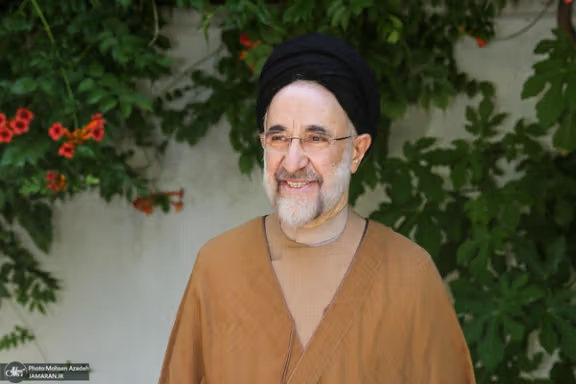
Iran’s former president has warned that the return of morality police to streets may lead to the regime's “overthrow by itself and social collapse”.
In a meeting with his advisors, Mohammad Khatami said: "It seems that the danger of self-overthrow, which has been talked about many times, stands out more than ever with the return of morality police."
The ‘morality’ police in Iran have returned to the streets of Tehran and other cities ahead of the first anniversary of Mahsa Amini's death in police custody last September, which triggered mass unrest in its wake.
The spokesman of Iran’s Police announced Sunday that special patrols are now deployed to deal with the continued wave of hijab rebels. Saeed Montazerolmahdi said those who "still insist on breaking the norms" will be dealt with.
On Monday, Khatami, who was president for eight years, said he was surprised by the "imprudence of the key officials" of the Islamic Republic because such “wrong methods will make the society more tense than before.”
Meanwhile, Tasnim news agency, affiliated to the Revolutionary Guard, said the decision to enforce the mandatory hijab by police was ordered by President Ebrahim Raisi, Interior Minister Ahmed Vahidi, and the judiciary. "The police are forced to execute this plan along with all their other duties," wrote Tasnim.
A video which went viral on Saturday showed Tehran's morality police arresting a teenage girl without compulsory hijab in the Gisha neighborhood.
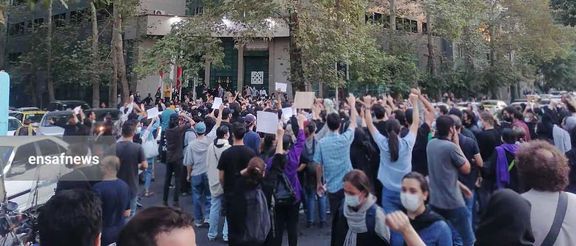
Some Iranian analysts and politicians continue criticizing the ruling establishment, within the limits of controlled media, for the country’s multiple crises.
However last week, prominent economist Mehdi Pazouki told Didban Iran website that government officials have humiliated the nation in the name of their revolutionary approach. Pazouki said, in an unprecedented and daring statement, "One of Khomeini's mistakes was allowing clerics to intervene in the country's social and executive affairs."
He was referring to the founder of the Islamic Republic, Ayatollah Ruhollah Khomeini who after the 1979 revolution gradually expelled independent-minded people from the government and increasingly relied on clerics that he knew had no experience in running a country.
Pazouki added that Iranian clerics can do their biggest service to Islam by migrating back to the seminaries. He further criticized officials for their lack of discipline in foreign relations and administrative affairs and said that as a result of government policies, banking in Iran lags behind other countries by at least 40 years.
Ahmad Alirezabeigi, a member of the Iranian parliament who is known for disclosing a major bribery case involving at least 75 other lawmakers and a former Industry Minister, accused officials of evading their responsibility and adding insult to injury by making statements that blame the people for the government's shortcomings.

He further accused state officials of mismanaging resources and failing to provide the conditions for the minimum means of livelihood. Alirezabeigi added that government policies stifle investments and make the economy more dependent on state enterprises.
While the country is suffering from energy and water shortage, the government creates obstacles for investment in these areas. It wants to do everything by itself but is incapable of completing any project.
This approach will inevitably lead to capital flight from the country, and add to public discontent.
Criticizing the government's economic policies, economist Pazouki highlighted the fact that Iran’s currency has lost its value 12-fold in five years, bringing inflation and misery to the people. He argued that government foreign and domestic policies have stifled an export-oriented economy.
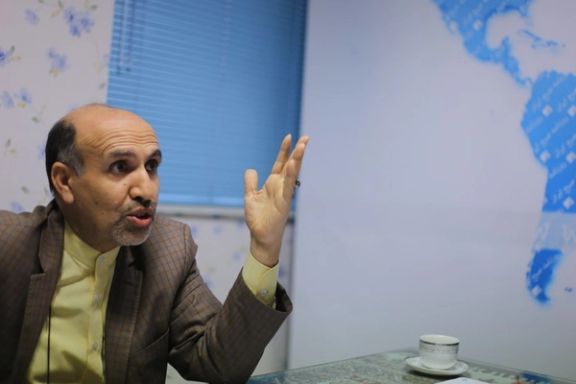
As a result, the government is spending more than its income leading to a huge budget deficit. "The main problem is in our governance. Our economy is hostage to our pending political decisions," he said, adding that although there are so many capable individuals in Iran, most current officials are much less qualified than former statesmen."
As an example, he said: "Just compare the current foreign minister to his predecessor, and you will find out that we have gone back by at least 40 years.
Expounding on the causes of Iran's rising inflation, Pazouki said: "Last year, Iraq sold $120 billion of oil while Iran's oil export was less than a quarter of that, and we still have not repatriated the money for the oil we have sold." He added: "We are likely to have even more problems if we refuse to come to terms with the world and follow a reasonable foreign policy," referring to the nuclear dispute with the West and crippling US sanctions.
In another developing, offering a way out of the problem, political commentator Abbas Abdi suggested that the government should find out about the true public mood and what ordinary people say.
“Send your agents to mingle with the people on the buses, subways, in the bazaar and shopping centers to talk with citizens and record what they say about their problems and needs.”
Abdi likened the perception of officials about the problems of ordinary folks to the elephant in the darkroom analogy in which everyone has a different perception of the elephant. Abdi suggested: "Turn the lights on and see the elephant!"

The US Deputy Special Envoy for Iran expressed concern that the morality police are again cracking down to enforce mandatory hijab.
"It seems the regime has learned nothing from the protests. Women and girls everywhere should be allowed to wear whatever they want," tweeted Abram Paley on Monday.
The office of the US Special Envoy for Iran showed its first signs of life following days of media storm about circumstances surrounding the former envoy’s dismissal on Friday.
The official twitter account of the mission said: “The Office of the Special Envoy for Iran and the entire team at the State Department remain engaged in implementing our policy on Iran.” The account had been inactive since early June, about a month before Rob Malley’s suspension was announced.
The ‘morality’ police in Iran have returned to the streets of Tehran and other cities ahead of the first anniversary of Mahsa Amini's death in police custody last September, which triggered mass unrest in its wake.
A video which went viral on Saturday showed Tehran's morality police arresting a teenage girl without compulsory hijab in the Gisha neighborhood.